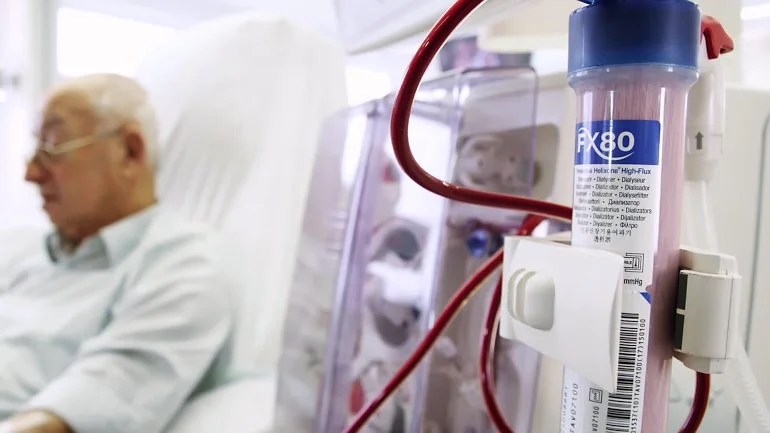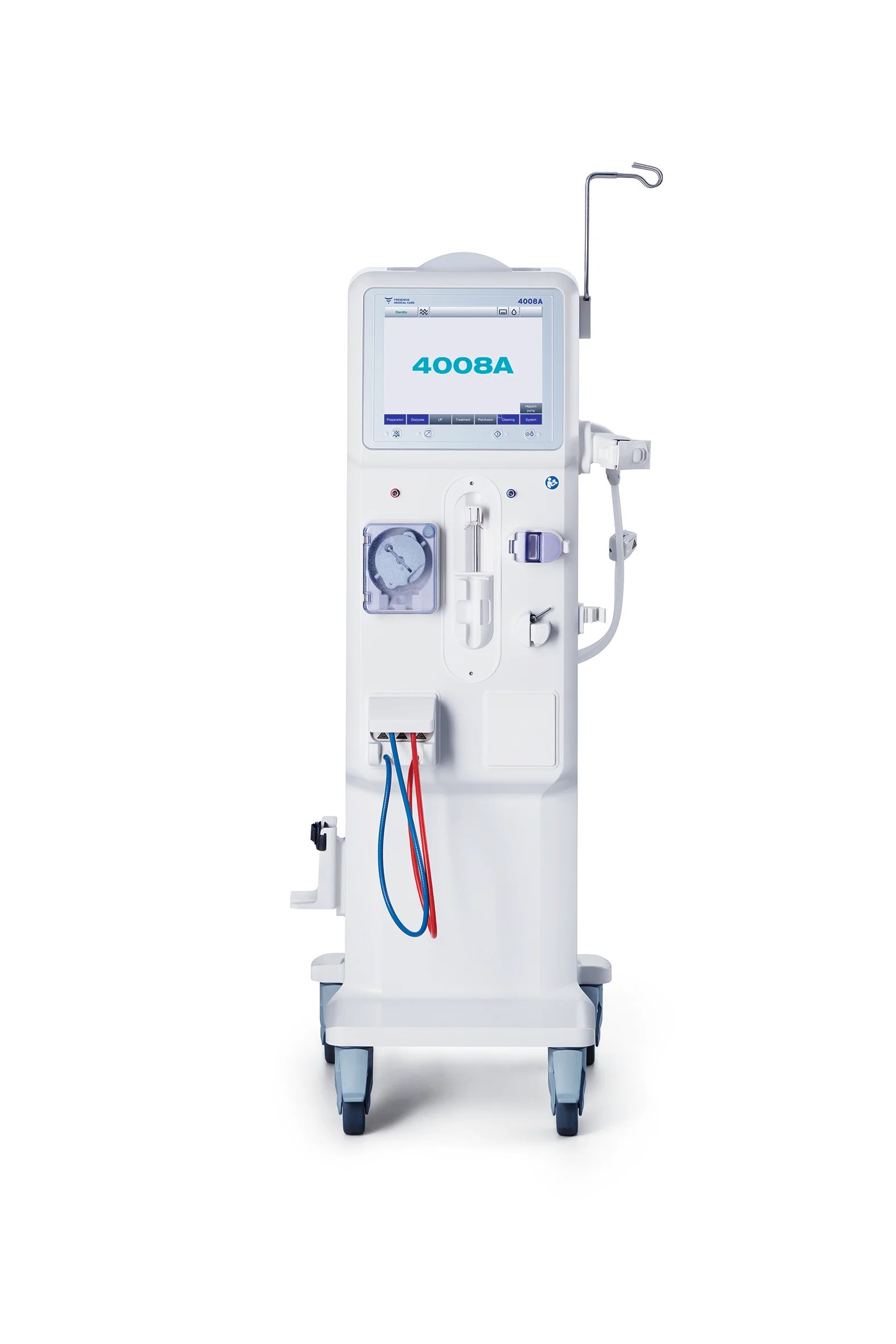Medical Care launched the 4008A dialysis machine, which was especially designed to meet the needs of emerging markets. Download Image (JPG 2347KB)
Medical Care, the world’s largest provider of dialysis products and services, today announced the launch of its 4008A dialysis machine, which was especially designed to meet the needs of emerging markets. With the launch of the 4008A, the company is aiming to improve accessibility to life-sustaining dialysis treatment for patients in these countries who are living with end-stage renal disease (ESRD).

The 4008A dialysis machine incorporates Medical Care’s high therapy standards while minimizing costs for health care systems. It has primarily been deployed in India, with other countries across the Asia-Pacific region to follow. Worldwide, there is an urgent and growing need for patients with ESRD to receive access to dialysis. A systematic review of worldwide access to treatment estimated that almost two million people in Asia with ESRD who needed dialysis were not receiving it – a treatment gap that is double the number of patients actively being treated. Worldwide use of dialysis is projected to more than double by 2030, with the most growth in Asia, but the number of people without access to dialysis is expected to remain substantial.
Fresenius 5008 Hemodialysis System
In response to this need, Medical Care has developed the 4008A, which provides life-sustaining medical benefits and safety standards at a cost-effective price. Dr. Olaf Schermeier, Chief Executive Officer for Global Research and Development at Medical Care, emphasized the importance of the 4008A launch: “Our global Research and Development team is in constant dialogue with physicians, nursing staff and patients. We put the benefit for our patients at the center of any new development. That is why we have developed this new high-quality dialysis platform that may allow for better cost effectiveness, and brought it to the market in record time.”
Harry de Wit, CEO of Medical Care Asia–Pacific, said: “At Medical Care, we are proud of the work we do every day to improve the lives of people living with chronic kidney disease. The launch of the 4008A is a demonstration of our continuing commitment to help ensure that life-changing dialysis is brought within reach of the increasing number of patients who need urgent access to this treatment.”
Importantly, the 4008A offers a high level of safety and handling standards, including essential cleaning functions and battery back-up. The machine is designed to be robust and easily handled, making it ideal for demanding infrastructure and remote locations.
Used Fresenius Medical Care 5008 Dialysis Machine V4.57 For Sale In Saarbrücken, Germany
The use of ultrapure dialysis fluid is standard in all treatments with the 4008A machine. Evidence suggests that using ultrapure dialysis fluid provides significant medical benefits to patients – for example, through better preservation of residual renal function, which is the ability of the patient’s own kidneys to eliminate water and uremic toxins.
In addition, the use of ultrapure dialysis fluid could also contribute to reduced inflammation for dialysis patients, potentially helping to reduce their cardiovascular risk and morbidity.
The dialysis machine and the dialyzer are the two most important products in hemodialysis. While the dialyzer filters the patient’s blood, the dialysis machine pumps it and monitors its circulation outside the body. The machine is also used to maintain the composition of the dialysis solution and introduce anticoagulants into the blood. Dialysis treatments generally last three to six hours, and are commonly carried out three times a week.
Fresenius Medical Care Launches 4008a Dialysis Machine Tailored To Needs In Emerging Markets
References 1 Liyanage T et al. Worldwide access to treatment for end-stage kidney disease: a systematic review. www.thelancet.com Published online March 13, 2015 http://dx.doi.org/10.1016/S0140-6736(14)61601-9. 2 Schiffl H et al. Ultrapure dialysis fluid slows loss of residual renal function in new dialysis patients. Nephrol Dial Transplant 2002;17: 1814–1818. 3 Shafi T., Jaar B., Plantinga L. Association of Residual Urine Output With Mortality, Quality of Life, and Inflammation in Incident Hemodialysis Patients: The Choices for Healthy Outcomes in Caring for End-Stage Renal Disease (CHOICE) Study. Am J Kidney Dis 2010; 56:348-358. 4 Termorshuizen F., Dekker F.Van Manen J. Relative Contribution of Residual Renal Function and Different Measures of Adequacy to Survival in Hemodialysis Patients: An analysis of the Netherlands Cooperative Study on the Adequacy of Dialysis (NECOSAD)-2. J Am Soc Nephrol 2004; 15: 1061–1070. 5 Obi Y., Rhee C., Mathew A. Residual Kidney Function Decline and Mortality in Incident Hemodialysis Patients. J Am Soc Nephrol 2016; 27: 3758–3768. 6 Sitter Tet al. Dialysate related cytokine induction and response to recombinant human erythropoietin in haemodialysis patients.Nephrol Dial Transplant 2000; 15: 2107–1211. 7 Lederer SR, Schiffl H. Ultrapure Dialysis Fluid Lowers the Cardiovascular Morbidity in Patients on Maintenance Hemodialysis by Reducing Continuous Microinflammation. Nephron 2002; 91: 452–455.

Medical Care is the world's largest provider of products and services for individuals with renal diseases of which around 3.2 million patients worldwide regularly undergo dialysis treatment. Through its network of 3, 872 dialysis clinics, Medical Care provides dialysis treatments for 329, 085 patients around the globe. Medical Care is also the leading provider of dialysis products such as dialysis machines or dialyzers. Along with its core business, the company provides related medical services in the field of Care Coordination. Medical Care is listed on the Frankfurt Stock Exchange (FME) and on the New York Stock Exchange (FMS).
Disclaimer This release contains forward-looking statements that are subject to various risks and uncertainties. Actual results could differ materially from those described in these forward-looking statements due to certain factors, including changes in business, economic and competitive conditions, regulatory reforms, foreign exchange rate fluctuations, uncertainties in litigation or investigative proceedings, and the availability of financing. These and other risks and uncertainties are detailed in Medical Care AG & Co. KGaA's reports filed with the U.S. Securities and Exchange Commission. Medical Care AG & Co. KGaA does not undertake any responsibility to update the forward-looking statements in this release.Whether you do home hemodialysis or in-center hemodialysis, you’ll rely on a hemodialysis machine to filter your blood. The machine filters your blood through a dialyzer, also known as an artificial kidney, with built-in safety checks to be sure the process is safe and effective. Home and in-center hemodialysis machines are very similar in function, though the home machine is much smaller.
Peritoneal Dialysis Machines
What is dialysate? Dialysate is a fluid that is made up of water, electrolytes and salts. During dialysis, dialysate helps to clean your blood inside the dialyzer by removing waste products and balancing electrolytes. Your nephrologist will prescribe the dialysate that is right for your body’s needs.
How is my dialysis treatment monitored? During your dialysis session, detailed information will show on the machine’s monitoring screen. Every function will be monitored, including the pump speed, blood pressure and dialysate temperature. Every check is designed to make sure your dialysis session is safe and effective.

An alert will sound if anything needs attention. An alert may simply mean the machine needs to be checked or something needs to be adjusted. If you’re doing home hemodialysis, you’ll be trained on what to do for any alert you might hear as part of your overall dialysis and safety training. You can also call your nurse 24/7 if you have questions or need assistance. If you receive in-center hemodialysis, your care team will monitor the machine throughout the process and make any adjustments necessary.
Dialysis Machines Fresenius 4008s Ng Supplier & Trader In Maharashtra,india
Your treatment will also be monitored through your personal Fresenius Kidney Care Portal. If you’re on home dialysis, you’ll log your daily treatment data for instant delivery to your care team. You’ll also be able to view lab results, track your supply order and communicate with your care team about any issues or concerns.
If the power goes offwhile your cycler is working, it will automatically close all the lines. The machine will store the information about your session using a backup battery. If the power comes back on soon, that stored information lets the machine continue the session. If not, it’s best to call your home dialysis nurse about what to do next—support is available 24/7 if you ever have questions or concerns.
During a typical dialysis treatment, only a pint of blood is outside of your body being cleaned and returned at any time. One pint is the same amount of blood you give during a donation.

Fresenius Medical Care 5008 Brief Operating Manual Pdf Download
Home hemodialysis machines function similarly to in-center machines, though they’re much smaller and easy to handle. Some home machines can fit on a nightstand—or you can take it with you when you travel.
Register with your local power company to get on their medical priority list. Letting your provider know that you use electricity for home dialysis can help you get your power restored faster.Almost 4.7 million people are treated because of suffering from chronic kidney failure around the world. The kidneys of these patients are unable to filter metabolic toxins and excess water from the blood for excretion through the urine. About 3.8 million patients rely on regular, life-saving dialysis treatment – either at a dialysis clinic or at home – to prevent the damage of further organs these toxins can cause when they accumulate in the blood.
When the kidneys fail, the whole body suffers. As the organs’ ability to

0 Response to "Fresenius Dialysis System Operation"
Posting Komentar